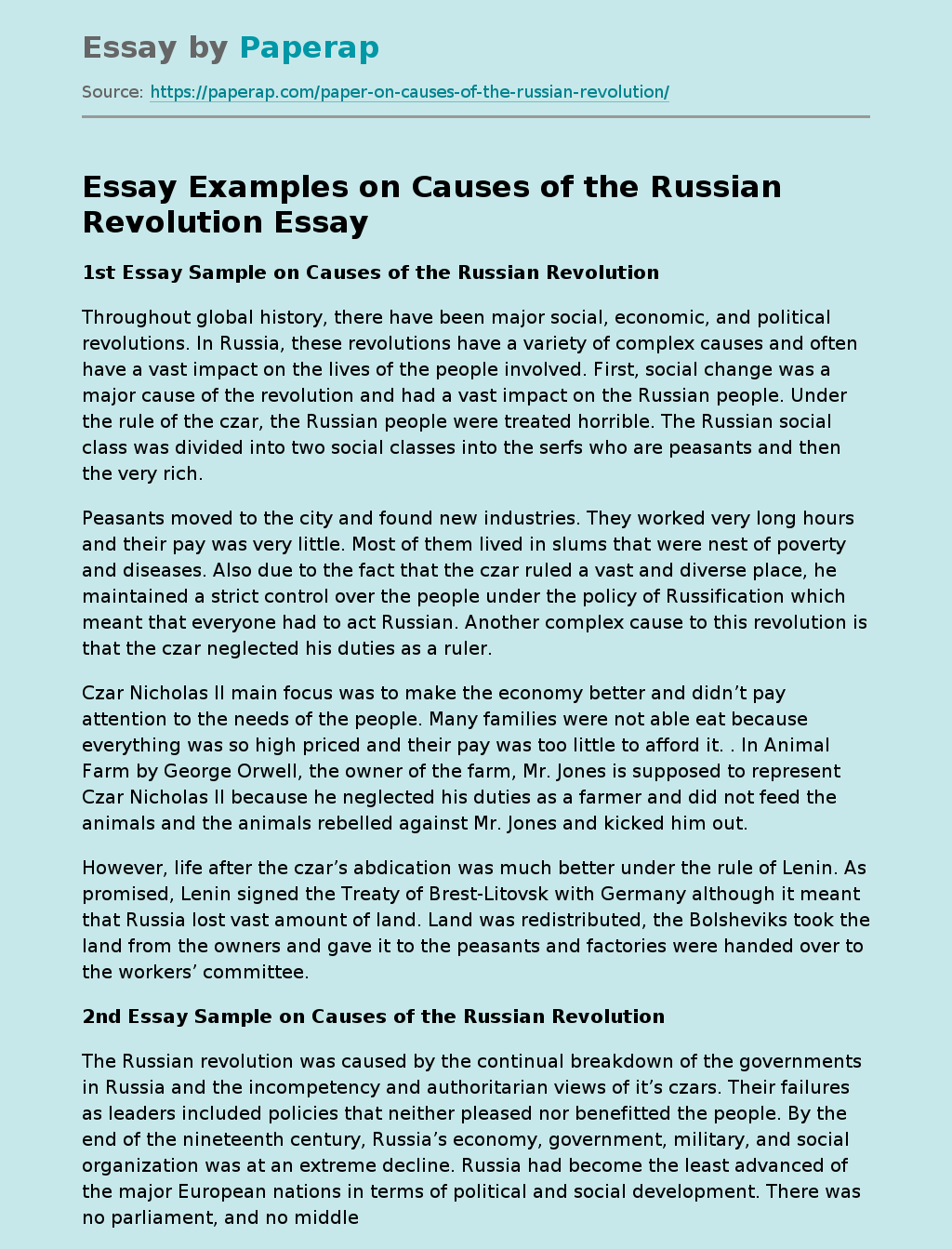Essay Examples on Causes of the Russian Revolution
1st Essay Sample on Causes of the Russian Revolution
Throughout global history, there have been major social, economic, and political revolutions. In Russia, these revolutions have a variety of complex causes and often have a vast impact on the lives of the people involved. First, social change was a major cause of the revolution and had a vast impact on the Russian people. Under the rule of the czar, the Russian people were treated horrible. The Russian social class was divided into two social classes into the serfs who are peasants and then the very rich.
Peasants moved to the city and found new industries. They worked very long hours and their pay was very little. Most of them lived in slums that were nest of poverty and diseases. Also due to the fact that the czar ruled a vast and diverse place, he maintained a strict control over the people under the policy of Russification which meant that everyone had to act Russian.
Another complex cause to this revolution is that the czar neglected his duties as a ruler.
Czar Nicholas II main focus was to make the economy better and didn’t pay attention to the needs of the people. Many families were not able eat because everything was so high priced and their pay was too little to afford it. . In Animal Farm by George Orwell, the owner of the farm, Mr. Jones is supposed to represent Czar Nicholas II because he neglected his duties as a farmer and did not feed the animals and the animals rebelled against Mr.
Jones and kicked him out.
However, life after the czar’s abdication was much better under the rule of Lenin. As promised, Lenin signed the Treaty of Brest-Litovsk with Germany although it meant that Russia lost vast amount of land. Land was redistributed, the Bolsheviks took the land from the owners and gave it to the peasants and factories were handed over to the workers’ committee.
2nd Essay Sample on Causes of the Russian Revolution
The Russian revolution was caused by the continual breakdown of the governments in Russia and the incompetency and authoritarian views of it’s czars. Their failures as leaders included policies that neither pleased nor benefitted the people. By the end of the nineteenth century, Russia’s economy, government, military, and social organization was at an extreme decline. Russia had become the least advanced of the major European nations in terms of political and social development. There was no parliament, and no middle class.
The Church, officers, and other important people and institutions were firmly against social progress. The disastrous defeat of Russia in the Crimean War in 1855 and 1856 exposed weaknesses of Russia’s various For thefirst few decades of the 1800’s, Russia’s outlook was brighter under Alexander I, who was relatively liberal. He became more reactionary however, and following his death, a group of young army officers tried to overturn the Czardom. This was called the Decembrist Revolt. The next czar, Nicholas, was a die hard authoritarian.
The Administrative system continued to decay regardless of his iron fisted rule. The gap between the rich and the poorer continued to widen. Over five hundred peasant revolts took place during his reign. Alexander II, who took the throne in 1855 tried to avert revolt by attempting reform. In 1861 he freed the serfs and gave them expectations of free land allotments.
But to their surprise, and anger, they were only given the opportunity to share it as members of a village commune(mir). In addition, the mir had to pay back the government for the land over a period of 49 years with interest. Alexander also formed a series of elected local councils that gave districts restricted jurisdiction of certain aspects of life.
Essay Examples on Causes of the Russian Revolution. (2019, Oct 10). Retrieved from https://paperap.com/paper-on-causes-of-the-russian-revolution/

